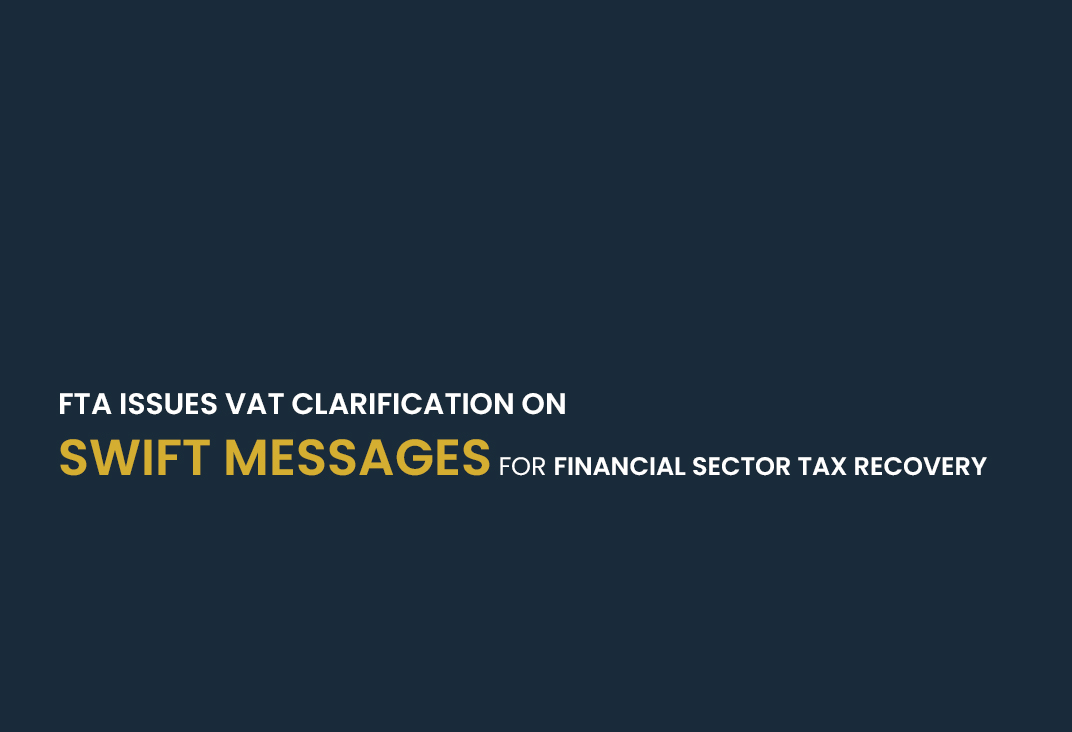The Federal Tax Authority of the UAE has released VAT Public Clarification offering directives on using SWIFT messages for both VAT documentation and the recovery of input tax.
The UAE financial institutions are treated as engaging in self-supplies when availing of interbank services from foreign banks. This means they must handle VAT obligations as if they were the service providers, including fulfilling all tax-related duties and generating tax invoices for the services received. However, SWIFT (Society for Worldwide Interbank Financial Telecommunications) messages, commonly used to document international bank charges and their underlying transactions, might not satisfy the required criteria to be acknowledged as tax invoices for UAE VAT compliance. But On February 5, 2024, the United Arab Emirates Federal Tax Authority (FTA) issued VAT Public Clarification VATP036 that addresses the use of SWIFT messages for VAT documentation and input tax recovery, initially focusing on the Financial Services (FS) sector but potentially impacting companies across various industries.
The question is, what made FTA simplify the process?
The FTA emphasizes that due to the substantial volume of SWIFT messages received, mandating Financial Institutions to self-issue a tax invoice for each SWIFT transaction would be impractical. Hence, the FTA introduces a simplification measure. If a SWIFT message, termed a “Qualifying SWIFT message,” includes adequate information to ascertain the details of the supply, UAE Financial Institutions are exempted from self-issuing tax invoices for interbank services received from non-resident banks when such SWIFT communications are received. Consequently, for input tax recovery purposes, a SWIFT message is deemed acceptable documentary evidence if it provides the necessary particulars of the supply.
A SWIFT message becomes a ‘Qualified SWIFT’ message if it includes;
• Name and address of the non-resident bank (SWIFT sender/supplier).
• Name of the UAE financial institution receiving the service (SWIFT receiver/customer).
• Date of the transaction.
• SWIFT message reference number.
• Transaction reference number.
• Description of the transaction.
• Consideration charged, and currency used.
Let’s explore who stands to gain from this simplification;
Financial Services Sector: The provided clarification serves as a beneficial simplification for the UAE FS sector, reducing administrative burdens. Businesses within this sector need to assess whether their exchanged SWIFT messages meet the criteria of a “Qualifying SWIFT Message” to benefit from this simplification. Adjustments to existing documentation and governance may be necessary to take full advantage of this provision.
Potential Broader Industry: The FTA explicitly states in the Public Clarification that, for service imports, the recipient must issue a valid tax invoice to itself, as the VAT legislation places the responsibility for “all tax obligations” on the recipient. If this clarification is intended as a general statement, it implies that any UAE business importing services, regardless of industry, would be obligated to self-issue a tax invoice to comply with UAE VAT invoicing requirements. This additional requirement, along with reporting output tax and recovering input tax if applicable, could become standard practice for all industries. Whether this self-invoicing mandate extends beyond the services discussed in this clarification remains to be cleared, as the FTA’s practical enforcement in various industries is yet to be determined.
How can MS help you with VAT Clarification on SWIFT Messages for Financial Sector Tax Recovery?
If you are uncertain about the appropriate course of action in the use of SWIFT messages for VAT documentation and input tax recovery, seeking guidance from experts like us could be a prudent decision. There’s a risk that the government might reject your request to claim the Input VAT if the documents did not have ample information. MS can make sure that you completely adhere to the regulations and make best use of the recent simplification.
